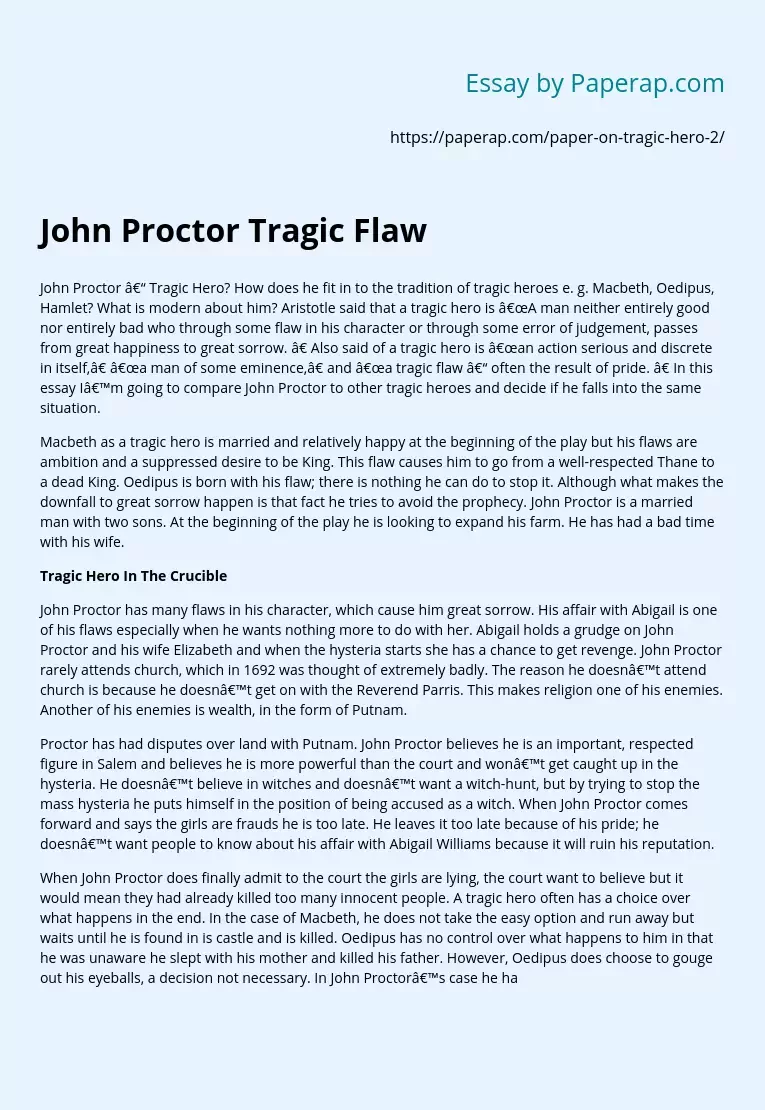John Proctor Tragic Flaw
John Proctor – Tragic Hero? How does he fit in to the tradition of tragic heroes e. g. Macbeth, Oedipus, Hamlet? What is modern about him? Aristotle said that a tragic hero is “A man neither entirely good nor entirely bad who through some flaw in his character or through some error of judgement, passes from great happiness to great sorrow. ” Also said of a tragic hero is “an action serious and discrete in itself,” “a man of some eminence,” and “a tragic flaw – often the result of pride.
” In this essay I’m going to compare John Proctor to other tragic heroes and decide if he falls into the same situation.
Macbeth as a tragic hero is married and relatively happy at the beginning of the play but his flaws are ambition and a suppressed desire to be King. This flaw causes him to go from a well-respected Thane to a dead King. Oedipus is born with his flaw; there is nothing he can do to stop it.
Although what makes the downfall to great sorrow happen is that fact he tries to avoid the prophecy. John Proctor is a married man with two sons. At the beginning of the play he is looking to expand his farm. He has had a bad time with his wife.
Tragic Hero In The Crucible
John Proctor has many flaws in his character, which cause him great sorrow. His affair with Abigail is one of his flaws especially when he wants nothing more to do with her.
Abigail holds a grudge on John Proctor and his wife Elizabeth and when the hysteria starts she has a chance to get revenge. John Proctor rarely attends church, which in 1692 was thought of extremely badly. The reason he doesn’t attend church is because he doesn’t get on with the Reverend Parris. This makes religion one of his enemies. Another of his enemies is wealth, in the form of Putnam.
Proctor has had disputes over land with Putnam. John Proctor believes he is an important, respected figure in Salem and believes he is more powerful than the court and won’t get caught up in the hysteria. He doesn’t believe in witches and doesn’t want a witch-hunt, but by trying to stop the mass hysteria he puts himself in the position of being accused as a witch. When John Proctor comes forward and says the girls are frauds he is too late. He leaves it too late because of his pride; he doesn’t want people to know about his affair with Abigail Williams because it will ruin his reputation.
When John Proctor does finally admit to the court the girls are lying, the court want to believe but it would mean they had already killed too many innocent people. A tragic hero often has a choice over what happens in the end. In the case of Macbeth, he does not take the easy option and run away but waits until he is found in is castle and is killed. Oedipus has no control over what happens to him in that he was unaware he slept with his mother and killed his father. However, Oedipus does choose to gouge out his eyeballs, a decision not necessary. In John Proctor’s case he has two options to save himself from his death.
He could go with Abigail to Boston and run away and avoid death and imprisonment. John Proctor does not like saving himself at the expense of others. Proctor hates hypocrisy, and he comes dangerously close to being a hypocrite himself. He tries to name Abigail a fraud without revealing the information about his affair with her. By the time he confesses it is too late to stop the craze from running its course. At the end, Proctor wrestles with the decision to save himself from the gallows with a confession. He does not want to go to the gallows with the others and have anyone think of him as a martyr because he refuses to confess out of spite.
He does not want to have to name the six other prisoners as guilty in his confession because he does not want to save his life by tarnishing the names of others. He does not want his signed confession nailed on the church door because it makes the six convicts look like unrepentant sinners. He chooses to go to the gallows because there is no way to save himself without putting blame on the names of the other prisoners. John Proctor doesn’t take the easy opportunities, as don’t the other tragic heroes. This is because taking these options is too convenient and goes against literary tradition.
John Proctor Tragic Flaw. (2019, Dec 05). Retrieved from https://paperap.com/paper-on-tragic-hero-2/

